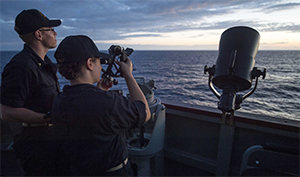The U.S. Merchant Marine Academy (USMMA) has produced a five-year strategic plan to foster a “climate of respect” at the college, which has been buffeted by allegations of sexual harassment and bullying.
In a joint statement in August announcing the release of “Navigating Towards the Future Together,” the administrator of the U.S. Maritime Administration, Rear Adm. Mark Buzby, and the academy’s superintendent, Rear Adm. James Helis, described the plan as the result of an “unparalleled” level of research and dialogue with academy stakeholders. It took 18 months to produce and is based on more than 700 interviews with midshipmen, staff, parents and others connected to the Kings Point, N.Y., campus.
The report outlines six priorities for the 75-year-old military academy but provides little detail on specific actions that will help achieve the goals.
Helis explained in October that “the USMMA strategic plan is aspirational, providing direction at the broadest and highest levels. Each strategic priority is articulated in order to provide broad and general direction in the form of overall objectives, supporting goals and potential metrics. Each strategic priority is assigned a working group whose job it is to refine the broader priorities into more specific actions or products.”
The superintendent added that “we are already seeing measurable progress as the working groups begin the task of refining the aspirational priorities into deliverable products and projects. For instance, we are about to start a number of critical infrastructure projects on the aging buildings and support systems at the academy. We are about to embark on a modernization effort for the dated and inefficient USMMA website. The midshipmen-led ‘BeKP’ campaign has had a significant positive impact on culture at the academy and continues to have a tangible impact on our core values.”
The plan for the school, which has an enrollment of more than 900, does not mention sexual harassment, bullying and other problems on the campus and on vessels during the Sea Year program. It addresses them indirectly by stating that the academy will be promoting a “culture in which every academy community member is respected, valued, and can fulfill his or her maximum potential as a leader of exemplary character.”
To achieve that culture, the report sets goals that include fostering a “climate of respect” among students, faculty and staff; developing a sense of “personal responsibility”; and ensuring “honest and transparent communication.”
The first priority is strengthening the educational program “through seamless collaboration” across activities. Providing an “educational program that fulfills the mission of the academy and provides the foundation for life-long professional growth for graduates” would be done in part by integrating academic, regimental and outside activities and demonstrating excellence in teaching. This would be achieved, in part, by additional student assessments, and by demonstrating proper planning and resource allocation.
The second priority is improving the institutional culture so that every academy community member “is respected, valued, and can fulfill his or her maximum potential as a leader of exemplary character.” This would be achieved by instilling a sense of personal responsibility, recruiting and retaining highly qualified faculty and staff from a variety of backgrounds, and ensuring “honest and transparent communication through regular engagement with internal and external stakeholders.” The academy will also “provide professional development programs for faculty, staff and administration that enhance intercultural awareness and appreciation for diversity.”
The third priority is infrastructure. The report calls for creating a campus master plan and making sure that maintenance is properly handled.
Governance, leadership and administration is the fourth priority. The plan calls for creating a Human Capital Plan to ensure “continuity of appropriately qualified personnel.” It also requires “transparent and timely availability of information to stakeholders,” and implementation of a process for academy leaders to receive feedback on their performance from staff and students.
Improving communications “to enhance the academy’s public image, facilitate stakeholder engagement, recruit and retain the best-qualified faculty, staff and midshipmen, and ensure timely and transparent messaging that builds trust and instills confidence in the institution” is the fifth priority. This should be achieved through “proactive and positive public relations, branding and outreach.”
The final priority is athletics. The academy must “emphasize the role and value of athletics in midshipman development and recruiting.” The plan strives to “create an environment where 100 percent of midshipmen are athletes through participation in NCAA varsity sports, intramural teams, club sports, and/or organized recreational programs.”
Academy officials did not respond to requests for more details on actions that would be taken to achieve the plan’s goals.
U.S. Rep. Peter King, a Long Island Republican on the academy’s Board of Visitors, said, “My first reaction to the plan is very positive. It seems to address core issues at the academy such as institutional culture and improvements to the academy’s infrastructure. I will continue to work with the academy to implement and improve all aspects of the plan.”

